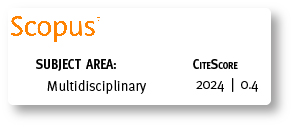Teachers’ perception of the institutional cultures, politics and inclusive practices. Case-study the University of Cuenca-Ecuador
DOI:
https://doi.org/10.18537/mskn.12.02.05Keywords:
Inclusive education, inclusion, index for inclusion, university, professorsAbstract
The right to education is a fundamental human right, and according to UNESCO (2015) is inclusive and quality education based on equity, flexibility and adaptability, all with the aim of leaving no one behind. In Ecuador, inclusive education is a recent process and underwent a series of changes influenced by policies and regulations that addressed diversity and guaranteed the right to higher education for all students. This article presents the results of an investigation designed to assess the belief of the teachers at the University of Cuenca (Ecuador) about inclusive cultures, policies and practices, using the Index for Inclusion as instrument. The evaluated dimensions of the index are the creation of cultures, the elaboration of policies, and the development of inclusive practices. All examined dimensions show a regular level of performance, however a distinction exists between the creation of inclusive cultures to a degree that closely resembles the development of inclusive practices, while the dimension of inclusive policymaking received the lowest feeling. The findings allow to differentiate the position of teachers on the analyzed aspects of inclusive education and highlight the bottlenecks to be addressed in the future, especially teacher training in inclusive education.
Downloads
Metrics
References
Ainscow, M., Booth, T., & Dyson, A. (2006). Improving schools, developing inclusion. London, UK: Routledge Publisher. https://doi.org/10.4324/9780203967157
Arnaiz, P., & Azorín, C. (2014). Autoevaluación docente para la mejora de los procesos educativos en escuelas que caminan hacia la inclusión. Revista Colombiana de Educación, 67, 227-245.
Asamblea Nacional. (2010). Ley Orgánica de Educación Superior (LOES). Registro Oficial, Suplemento 298: 1-83. Quito, Ecuador: Presidencia de la República del Ecuador,
Barrio de la Puente, J. (2008). Hacia una educación inclusiva para todos. Revista Complutense de Educación, 20(1), 13-31.
Booth, T., & Ainscow, M. (2000). Index for inclusion. 130 pp. Bristol, UK: Centre for Studies on Inclusive Education (CSIE).
Booth, T., & Ainscow, M. (2002). Index for inclusion: developing learning and participation in schools. 106 pp. Bristol, UK: Centre for Studies on Inclusive Education (CSIE).
Calvo, M., & Verdugo, M. (2012). Educación inclusiva, ¿Una realidad o un ideal? Edetania, 41, 17-30.
Colmenero, M. (2015). Caminando hacia una educación inclusiva. Caminando hacia una sociedad inclusiva. Iniciación a la investigación, 6(4), 1-18.
Cotán, A. (2017). Educación inclusiva en las instituciones de educación superior: narrativas de estudiantes con discapacidad. Revista Española de Discapacidad, 5(I), 43-61. https://doi.org/10.5569/2340-5104.05.01.03
Darreche, L., Fernández, J., & Goicoechea, P. (2010). Educación inclusiva ¿La educación inclusiva como utopía que nos ayuda a caminar? Buenos Aires, Argentina: Congreso Iberoamericano de Educación METAS 2021, 21 págs.
Echeita, G. (2013). Inclusión y exclusión educativa. De nuevo voz y quebranto. Revista Iberoamericana sobre Calidad, Eficacia y Cambio en Educación, 11(2),
-118.
Gallegos, M. (2015). La educación inclusiva una respuesta a los postulados del Buen Vivir. En la Educación Inclusiva una Respuesta a los postulados del Buen Vivir. Quito, Ecuador: Editorial Abya-Yala. Recuperado de https://dspace.ups.edu.ec/handle/123456789/11031
Gil, A., & Morales, M. (2019). Diversidad y educación inclusiva en Universidades: Cambiar estigmas y ordenar conceptos. Revista Metropolitana de Ciencias Aplicadas, 2(1), 160 -165
González, M. (2016). Propuesta de aplicación del “Index for Inclusion”. XII Congreso internacional y XXXIII Jornadas de Universidades y Educación Inclusiva. 11 págs. Madrid, España: Universidad de Complutense.
Gutiérrez, M., Martín, M., & Jenaro, C. (2018). La cultura, pieza clave para avanzar en los centros educativos. Revista de Educación Inclusiva, 11(2),
-26.
Herdoíza, M. (2015). Construyendo igualdad en la educación superior. Fundamentación y lineamientos para transversalizar los ejes de igualdad y ambiente. 176 págs. Quito, Ecuador: SENESCYT/UNESCO. Recuperado de https://www.educacionsuperior.gob.ec/wp-content/uploads/downloads/2018/11/Construyendo-igualdad-en-la-educacion-superior_nov_2018.pdf
Heskia, M., Lepeley, C., Recabarren, C., & Suarez, M. (2019). Docencia para la inclusión en Educación Superior. Desarrollando prácticas inclusivas. 78 págs. Universidad del Desarrollo. Recuperado de https://repositorio.udd.cl/bitstream/handle/11447/2797/ Docencia%20para%20la%20inclusión%20en%20educación%20superior%20desarrollando %20competencias%20inclusivas.pdf?sequence=1&isAllowed=y
Hurtado, Y., Mendoza, R., & Viejó, A. (2019). Los desafíos de la formación docente inclusiva: Perspectivas desde el contexto Latinoamericano. Revista Internacional de Apoyo a la Inclusión, Logopedia, Sociedad y Multiculturalidad. 5(2). https://dx.doi.org/10.17561/riai.v5.n2.9
Martínez, M. J. (2021). Inclusión educativa comparada en Unesco y OCDE desde la cartografía social. Educación XXI, 24(1), 93-115, http://doi.org/10.5944/educXX1.26444
Méndez, S., Saura, M., & Muntañola, J. (2014). Arquitectura y urbanismo ¿Inclusivos? Conference: Barcelona Inclusiva 2014. 1er Congreso Internacional de Orientación para una Sociedad Inclusiva. Barcelona. http://hdl.handle.net/2117/24191
Morales, P. (2012). Estadística aplicada a las Ciencias Sociales. Tamaño necesario de la muestra. Recuperado de https://web.upcomillas.es/personal/peter/ investigacion/Tama%f1oMuestra.pdf
Rodríguez, E., González, F., Pastor, E., & Vidal, R. (2020). Validación de un cuestionario sobre la actitud docente a la educación inclusiva en Chile. Foro Educacional, 35, 63-68. https://dx.doi.org/10.29344/07180772.35.2650
Ruiz, R. (2019). Políticas y prácticas pedagógicas inclusivas para la generación de una cultura inclusiva. 230 págs. Universidad de Tolima, Ibagué, Colombia: Editorial Ibagué.
Salceda, M., & Ibáñez, A. (2015). Adaptación del Index for Inclusion al ámbito de la educación superior: Estudio preliminar. Intangible Capital, 11(3), 508-545. https://doi.org/10.3926/ic.647
SENPLADES. (2013). Plan Nacional de Desarrollo y Plan Nacional para el Buen Vivir 2009-2013: Construyendo un Estado Plurinacional e Intercultural. ISBN: 978-9978-92-794-6 Secretaría Nacional de Planificación y Desarrollo – SENPLADES. Quito, Ecuador.
UNESCO (2006). La educación inclusiva, el camino hacia el futuro. Conferencia internacional de educación. Centro Internacional de Conferencias Ginebra, UNESCO, ED/BIE/CONFINTED48/1.
UNESCO. (2015). El desarrollo sostenible comienza por la educación. Cómo contribuir la educación a los objetivos propuestos para después de 2015. Organización de las Naciones Unidas para la Educación, la Ciencia y la Cultura. Recuperado de https://www.entreculturas.org/sites/default/files/educacion_y_ods.pdf
Universidad de Cuenca. (2019). Informe de Gestión 2019. Cuenca, Ecuador: Universidad de Cuenca.
Published
How to Cite
Issue
Section
License
Copyright (c) 2021 Ruth Clavijo-Castillo, María-Josefa Bautista-Cerro

This work is licensed under a Creative Commons Attribution 4.0 International License.
Copyright © Autors. Creative Commons Attribution 4.0 License. for any article submitted from 6 June 2017 onwards. For manuscripts submitted before, the CC BY 3.0 License was used.
![]()
You are free to:
 |
Share — copy and redistribute the material in any medium or format |
 |
Adapt — remix, transform, and build upon the material for any purpose, even commercially. |
Under the following conditions:
 |
Attribution — You must give appropriate credit, provide a link to the licence, and indicate if changes were made. You may do so in any reasonable manner, but not in any way that suggests the licenser endorses you or your use. |
| No additional restrictions — You may not apply legal terms or technological measures that legally restrict others from doing anything the licence permits. |









